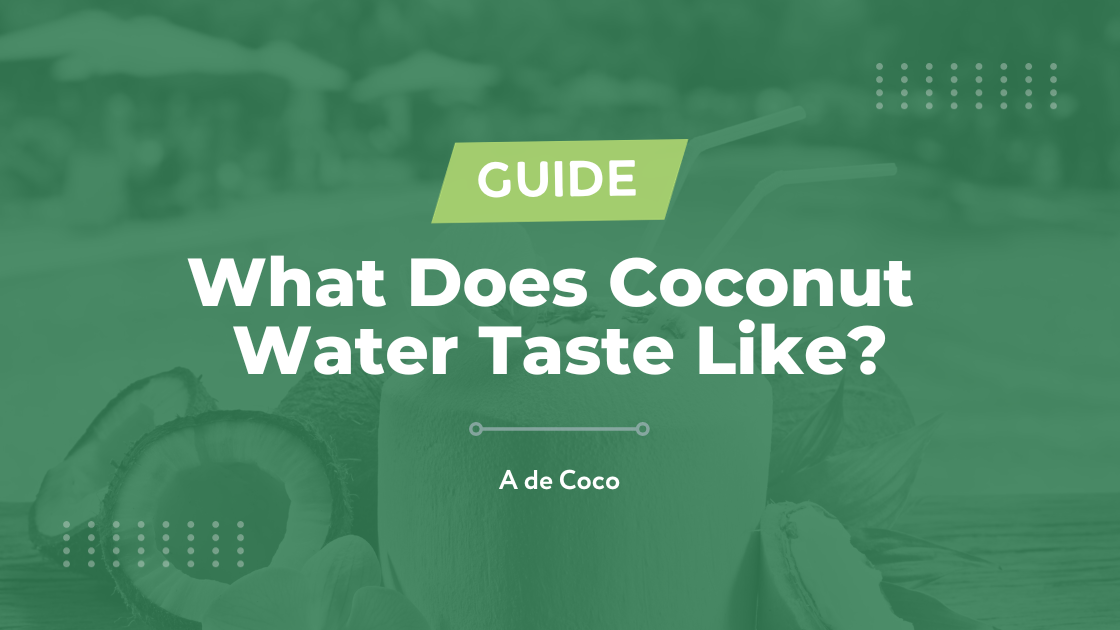In today’s post, we delve into a comprehensive taste analysis of a tropical beverage that has taken the world by storm in the recent years.
Known for its hydrating properties and impressive nutrient mix, this natural drink has swiftly ventured out of its native tropical lands onto the shelves of supermarkets worldwide.
Whether consumed post-workout, as an alternative to sugary drinks or for overall wellbeing, the particular flavor profile it offers is a topic of intrigue for many.
This liquid, extracted from young green coconuts, indeed is a topic of varied discourse amongst even the most seasoned food connoisseurs.
Thus, to answer curiosity, we will dissect the taste thereunder, addressing common descriptors.
The aim is to provide an informed opinion on what your palate can anticipate when sipping on this tropical refreshment.
Contents
- What Does Coconut Water Taste Like?
- The Natural Flavor of Coconut Water
- Common Descriptions of Coconut Water Taste
- How Does Coconut Water Compare to Regular Water?
- Coconut Water vs. Fruit Juices – A Taste Comparison
- Factors that Can Modify the Flavor of Coconut Water
- Can The Size of the Coconut Affect its Water Taste?
- Nutritional Composition and Its Influence on Flavor
- How Processing Affects the Taste of Coconut Water?
- Comparing Fresh and Packaged Coconut Water Taste
- Ways to Enhance or Change the Taste of Coconut Water
- Final Thoughts
What Does Coconut Water Taste Like?
Coconut water has a unique taste that can be described as sweet and nutty with a slight hint of saltiness. It also carries a subtle flavor that is similar to that of plain water, making it refreshing to many. The taste can slightly differ based on the ripeness of the coconut, with younger coconuts having a sweeter taste compared to the more savory flavor of mature coconuts.
While this explains the basic flavor profile of coconut water, getting the most enjoyment out of this tropical refreshment requires a bit more understanding.
Beyond the initial taste, several factors influence the overall experience of drinking coconut water.
Factors such as processing methods, nutrition benefits, different uses and how the taste compares with other natural beverages can turn a simple act of quenching thirst into quite a tasty affair.
So, let’s unravel these elements as they indeed add to the fascination world of coconut water.
The Natural Flavor of Coconut Water
Digging deeper into the natural flavor of coconut water, we embark on a unique flavor journey that transports us to tropical climes with each sip.
The taste is intriguing, mildly sweet yet subtle, almost nutty, offering a fresh aftertaste that is rather unique in the realm of natural beverages.
The flavor of coconut water reflects the purity of nature, emanating from the heart of one of the most nourishing fruits on earth.
This natural elixir is enclosed in its raw, unprocessed form in the hard shell of the coconut, safeguarded from external pollution.
Each coconut holds a standardized amount of coconut water, bearing the quintessence of tropical freshness.
The flavor of coconut water reflects the purity of nature.
To understand this better, it is ideal to compare the flavor of coconut water to other natural beverages.
This comparison not only provides a familiar reference point, but also assists in knowing the uniqueness of the flavor profile of coconut water.
A key element of the natural flavor of coconut water stems from its sweet yet slightly saline taste that comes from its high mineral content.
It also has a certain creaminess to its texture, thanks to its abundance of potassium, calcium, and magnesium.
This depth of flavor is rather hard to find in other natural beverages.
While many beverages need sweeteners to enhance their taste, coconut water needs no such additives.
Its natural sweetness is a defining characteristic of its taste profile, allowing it to naturally hydrate with a pleasant flavor.
Its natural sweetness is a defining characteristic of its taste profile.
Equating this to sugary sport drinks or artificial beverages would be misleading, as the sweetness in coconut water is completely natural.
This makes it vastly distinct not only in flavor but also in terms of its health benefits.
The natural flavor of coconut water is indeed a complex symphony of slight sweetness and nuttiness accompanied by a creamy texture and refreshing aftertaste.
A thorough understanding of this symphony could help us better appreciate the distinct and unique flavor of coconut water.
Common Descriptions of Coconut Water Taste
Coconut water is known for its distinct and unique flavor profile that can be difficult to describe as it encompasses a variety of sensory experiences.
Often, it is characterized as being slightly sweet and nutty, with a subtle hint of a tropical flavor reminiscent of the coconut’s natural environment.
This natural sweetness comes from the sugar content inherent in the water, although the sweetness is much milder compared to traditional fruit juices or sugary beverages.
Similarly, the slight nuttiness is representative of the coconut flesh from which the water is derived.
Coconut water incorporates this nutty quality subtly, without overpowering the overall flavor profile, a uniqueness which has been greatly appreciated.
This characteristic adds a multi-dimensionality to the taste that separates coconut water from regular, unflavored water.
Remarkably, coconut water also possesses an inherent saltiness.
This salty taste contributes to the drink’s reputation as an excellent hydration beverage.
It is a result of the natural mineral composition of the water, which includes health-boosting electrolytes like potassium and sodium.
This combination of sweet, nutty, and salty gives coconut water its distinguishing taste that sets it apart from other natural beverages.
– Slight Variations
Despite these commonly agreed descriptions, the taste of coconut water can slightly vary depending on several factors.
These factors can include the variety of the coconut, its maturity, and the method of processing used to extract and package the water.
Typically, younger coconuts tend to have a fresher and sweeter flavor, while as coconuts mature, their water develops a fuller and more complex taste.
The taste of coconut water is not monolithic but has slight variations that make each sip a unique experience.
Despite these small variations, its unique blend of flavors remains consistent, providing a refreshing and distinctive taste that has won over hearts globally.
– Not Everyone’s Cup of Tea
While coconut water has gained international popularity and wide acceptance, it’s important to note that its flavor isn’t universally loved.
Some people describe it as having an earthy or slightly bitter aftertaste, which can be off-putting for some.
These differing opinions on the taste of coconut water further underline its unique and diverse flavor profile.
Despite the differing perceptions, many have come to appreciate its unique taste and the variety of health benefits it brings to the table.
The versatility and uniqueness of coconut water’s flavor make it a fascinating drink to explore and enjoy.
How Does Coconut Water Compare to Regular Water?
When it comes to hydration, many people wonder how coconut water compares to regular water.
Coconut water is often hailed as a natural health drink, with a unique blend of nutrients and enzymes that can be beneficial for hydration and recovery.
Regular water is a key element for staying hydrated, vital for every cell, tissue, and organ in your body.
Coconut water, on the other hand, provides additional electrolytes like potassium, sodium, and magnesium, minerals that are lost through sweat and need replacing for optimal bodily functions.
As a result, coconut water is often considered a natural sports drink due to its capacity to replenish water and electrolytes simultaneously.
Coconut water is often considered a natural sports drink due to its capacity to replenish water and electrolytes simultaneously.
Backing up this assertion, coconut water has been shown to rehydrate the body after exercise comparably to traditional sports drinks in certain studies.
Nonetheless, it’s worth noting that drinking plain water alongside a balanced diet can reintroduce these minerals as well.
When comparing the nutrient composition of both, you will discover that unlike water, coconut water contains a modest amount of calories and sugars.
This fact may be crucial for those who are on a calorie-restricted diet or who are monitoring their sugar intake.
Moreover, coconut water comes loaded with b-vitamins, amino acids, phytohormones, and antioxidants, making it more nutrient dense than typical water.
Coconut water comes loaded with b-vitamins, amino acids, phytohormones, and antioxidants, making it more nutrient dense than typical water.
Apart from these nutritional benefits, the antioxidants present in coconut water can help combat oxidative stress, a key factor in aging and chronic diseases.
Therefore, while regular water is critical for hydration, coconut water can offer supplemental nutrients that water lacks.
Regular water’s neutral taste is loved by some and seen as boring by others.
Meanwhile, coconut water has a unique, slightly sweet and nutty flavor derived naturally from the coconut fruit.
This distinction in taste often makes coconut water a popular alternative for those searching for a more flavor-filled hydration option.
Coconut Water vs. Fruit Juices – A Taste Comparison
When evaluating the taste of coconut water versus fruit juices, it is essential to note that these drinks originate from different plant types and vary significantly in flavor complexity and sweetness.
Coconut water often has a more subtle flavor profile than most fruit juices because of its higher water content.
Its taste can be described as slightly sweet and nutty, and it does not tend to possess the sharp tang often found in fruit juices such as orange or apple juice.
Coconut water often has a more subtle flavor profile than most fruit juices.
This complex but subtle flavoring of coconut water often makes it less overwhelming on the palate than fruit juices, which can possess an intense and concentrated fruit flavor.
Furthermore, coconut water’s natural hint of salinity can provide a more balanced and refreshing taste experience compared to the predominantly sweet profile of fruit juices.
– Sweetness
When it comes to sweetness, coconut water is naturally less sweet than most fruit juices.
Though fruit juices may taste pleasant due to their sugar content, their high sugar levels may make them less optimal for regular and sustained hydration.
Coconut water, on the other hand, contains less sugar while still providing a naturally sweet taste, making it a healthier beverage choice.
Coconut water contains less sugar while still providing a naturally sweet taste, making it a healthier beverage choice.
Thus, the relatively lower sweetness of coconut water can be an advantage for those looking for a hydrating drink that is not overly sweet or calorie-laden.
Moreover, due to its natural sweetness, coconut water usually does not require additional sweeteners, unlike some fruit juices.
– Nutritional Profile’s Impact on Taste
The nutritional profile of a beverage also impacts its taste, and coconut water is packed with vitamins and minerals like potassium and magnesium, which contribute to its unique flavor.
In contrast, despite their vitamin content, some fruit juices may contain additives and preservatives that can alter their taste or sweetness.
This makes coconut water a cleaner, more natural tasting alternative to many processed fruit juices.
Coconut water is a cleaner, more natural tasting alternative to many processed fruit juices.
These factors together explain why some individuals may find the taste of coconut water more refreshing and light compared to the intense sweetness and flavor of fruit juices.
Ultimately, the choice between these beverages could be a matter of personal preference, dietary needs, and desired taste experience.
Factors that Can Modify the Flavor of Coconut Water
When enjoyed straight from a freshly picked coconut, nothing rivals the natural taste of coconut water.
However, the flavor you experience can be influenced by a variety of factors, including the type of coconut, its maturity, storage methods, and processing techniques.
Let’s explore these elements in detail.
– Type of Coconut
Did you know there are hundreds of varieties of coconuts?
It’s true, and each variety produces coconut water with a unique flavor profile.
For example, Dwarf coconuts yield sweeter water, while Tall coconut varieties often produce a water with a more neutral or slightly salty taste.
This diversity in coconut types can lead to significant variability in the taste of the water they produce.
Dwarf coconuts yield sweeter water, while Tall coconut varieties often produce a water with a more neutral or slightly salty taste.
Your preference for a particular taste profile might lead you towards coconut water from a specific variety.
On the other hand, exploring different varieties could open up a new world of flavors for you to enjoy.
– Coconut Maturity
One of the most significant factors that can alter the taste of coconut water is the age of the coconut when it’s harvested.
In its young stage, a coconut’s water is sweetest.
As the coconut matures, the water begins to lose its sweetness and takes on a more earthy, nutty flavor, which some people might find less pleasing.
As the coconut matures, the water begins to lose its sweetness and takes on a more earthy, nutty flavor.
Harvesting coconuts at just the right age is thus key to achieving the optimal balance of sweetness and flavor.
This selection process plays an essential role in the taste of the final product.
– Storage and Processing Methods
The way coconut water is stored and processed can also affect its flavor.
For example, heating or pasteurizing the water can cause it to lose its fresh, natural taste and acquire a slightly cooked flavor.
Similarly, if stored improperly, coconut water can ferment, resulting in a sour taste.
Whether you prefer sweet young coconut water or a more mature, earthy flavor, understanding these factors can help you choose a coconut water that suits your palate.
Can The Size of the Coconut Affect its Water Taste?
As widely consumed as they are, not all coconuts taste exactly the same.
One factor that can significantly affect the taste of coconut water is the size of the coconut itself.
Coconuts pass through several stages of development, each of which influences the taste of the coconut water contained within.
This development is not solely based on size – two coconuts of the same size may not necessarily be at the same stage of development due to differing growth rates or environmental factors – but size can be a useful general indicator of a coconut’s developmental stage.
During early stages of development, coconuts are still quite small and their water is often described as sweet and tender.
This is because, at this point, the coconut is still concentrating its energy on producing sugars.
This development is not solely based on size – two coconuts of the same size may not necessarily be at the same stage of development due to differing growth rates or environmental factors – but size can be a useful general indicator of a coconut’s developmental stage.
This quote illustrates that while size is not the only factor to consider, it can still contribute to understanding the taste profile of a coconut.
By looking at size in combination with other factors, we can develop a more accurate understanding of the likely flavor of a coconut’s water.
– Size and the Concentration of Nutrients
Over time, as the coconut continues to grow, a shift happens in the composition of the coconut water.
Nutrients become more concentrated as the coconut matures.
Consequently, the flavor begins to evolve, losing some of its initial sweetness and becoming more pronounced and complex.
Large, mature coconuts typically have richer, more full-bodied water.
This is primarily due to the increased nutrient concentration which develops over time.
However, the flesh of mature coconuts can also contribute somewhat to the flavor of the water as it seeps in.
– Age Over Size
As a final note, it should be stated that age is typically a more reliable determinant of coconut water flavor than size.
A smaller coconut that has had sufficient time to mature may have more flavorful water than a larger, younger coconut.
The aging process allows for the accumulation of nutrients and sugars, which in return enhances the taste of the water.
When purchasing coconuts, it is therefore advisable to consider both the size and the perceived age of the coconut as assessed through markers such as color and hardness of the shell.
This combined approach will yield the best results in terms of flavor.
Age is typically a more reliable determinant of coconut water flavor than size.
As supported by this quote, while size can provide an indication of flavor, other factors such as age and maturity also play a significant role in determining the taste of coconut water.
Therefore, to choose the most flavorful coconut, a comprehensive assessment considering both size and age is required.
Nutritional Composition and Its Influence on Flavor
The unique and refreshing taste of coconut water is directly influenced by its nutritional composition.
This nutritional make-up includes a high concentration of electrolytes, vitamins, and minerals which can affect its taste.
Understanding the relationship between nutritional composition and flavor can help us appreciate coconut water even more.
– Nutrient Profile of Coconut Water
Let’s start by looking at the core nutrient profile of coconut water.
This wonder-drink is very low in calories, contains no cholesterol, and has minimal amounts of fat.
More notably, coconut water is equipped with an impressive array of natural minerals like potassium, magnesium, sodium, and calcium – all of which can contribute to its taste.
More notably, coconut water is packed with an impressive array of natural minerals like potassium, magnesium, sodium, and calcium – all of which can contribute to its taste.
It also contains a wonderful assortment of vitamins, notably vitamin C.
The sheer diversity of minerals and vitamins in coconut water directly affect its overall taste.
– Electrolytes and Their Role in Flavor
One key signature of coconut water is its high electrolyte content.
Electrolytes provide a certain taste to the coconut water – a mild sweetness coupled with a tangy undertone.
Sodium and potassium, for example, give it a somewhat salty touch, while naturally occurring sugars give it a sweet flavor.
Sodium and potassium, for example, give it a somewhat salty touch, while naturally occurring sugars give it a sweet flavor.
Without these electrolytes, coconut water would lose much of its signature taste.
– Influence of Vitamins on Coconut Water Taste
Coconut water is rich in vitamins, particularly vitamin C. This vitamin plays a significant part in the flavor profile of coconut water.
Vitamin C imparts a hint of acidity to the water, adding depth to its flavor.
Moreover, the fact that this vitamin is water-soluble means it can blend well with the water, enhancing its natural taste.
Vitamin C imparts a hint of acidity to the water, adding depth to its flavor.
Therefore, when you taste that slight tang in your coconut water, you’re essentially tasting the effects of vitamin C.
How Processing Affects the Taste of Coconut Water?
The process of packaging has a significant impact on the flavor of coconut water.
With the increasing popularity of this tropical drink, most coconut water available to consumers today undergo production and preservation processes to extend its shelf life.
Although these methods help make the beverage available globally and prevent microbial growth, they can adversely affect the coconut water’s natural flavor and nutritional profile.
– Heat Pasteurization
The most common preservation method used on coconut water is heat pasteurization.
Here, the coconut water undergoes a high-temperature treatment to kill harmful bacteria and extend shelf life.
However, this high heat process can result in a slight caramelization of the sugars, leading to a sweeter taste and darker color.
Also, it can potentially degrade some of the vital nutrients and enzymes, thereby altering the flavor significantly.
Apart from changing the taste, heat pasteurization also leads to loss of some of coconut water’s health benefits.
Apart from changing the taste, heat pasteurization also leads to loss of some of coconut water’s health benefits.
This quote suggests that the heating process may rob coconut water of some of its beneficial properties, which include providing hydration and essential nutrients.
Processing methods should thus maintain a balance between preserving and retaining the natural characteristics of the drink.
– Cold Pasteurization
Another commonly used method is cold pasturization, also known as High-Pressure Processing (HPP).
HPP employs high pressure to deactivate bacteria, yeasts, and molds that could cause spoilage, without the usage of heat or chemicals.
This method preserves the taste, nutrition, and overall quality of fresh coconut water to a larger extent when compared to heat pasteurization.
However, it is a more expensive method, which might result in costlier coconut water products in the market.
– Additives and Preservatives
Some brands might also add additives and preservatives to improve the shelf life, enhance the taste, or modify the color of the coconut water.
Though these might make the drink more aesthetically pleasing, they could alter the natural flavor, making it taste less fresh and more like a traditional processed beverage.
Coconut water with additives often tastes sweeter and less natural than fresh coconut water.
Coconut water with additives often tastes sweeter and less natural than fresh coconut water.
These alterations in taste, while they might appeal to some consumers, detract from the inherent, fresh taste of coconut water that many consumers enjoy.
Therefore, it’s essential that manufacturers clearly label any additions to their coconut water products to allow consumers to make the right choice based on their preference.
In conclusion, understanding how processing affects the flavor of coconut water can help people make informed decisions about the brands they choose to consume.
Comparing Fresh and Packaged Coconut Water Taste
The taste of coconut water can be significantly influenced by whether it is fresh or packaged.
There are notable differences between the two versions, both in flavor, nutritional value, and overall freshness.
Unquestionably, the flavor of fresh coconut water is superior to that of packaged versions.
It boasts a natural sweetness, a hint of nuttiness, and a refreshing finish that is hard to replicate.
On the other hand, packaged coconut water often contains added sugars and preservatives, which can greatly alter the refreshing, subtle taste of natural coconut water.
Packaged coconut water often contains added sugars and preservatives, which can greatly alter the refreshing, subtle taste of natural coconut water.
This alteration in taste can be off-putting to some consumers, who prefer the natural sweetness and nuttiness offered by fresh coconut water.
The addition of sugar and preservatives is not just for flavor but to extend shelf life, something that’s not required in fresh coconut water.
– Impact on Nutritional Value
An important aspect to consider in the fresh vs.
packaged debate is the impact on nutritional value.
Fresh coconut water, straight from the coconut, preserves all its nutritional richness.
It is packed with vitamins, minerals, electrolytes, and enzymes that our body needs.
However, in packaged coconut water, the nutritional value can decrease due to the processing and preservation methods used.
Furthermore, the addition of sugars and other additives can further dilute the nutritional content.
The nutritional value can decrease in packaged coconut water due to the processing and preservation methods used.
This loss of nutritional value can make a big difference, particularly if you are consuming coconut water for its health benefits.
The high potassium and low sodium content of coconut water, for instance, makes it a great option for replenishing electrolytes after exercise, but this balance can be disrupted in packaged versions.
Ways to Enhance or Change the Taste of Coconut Water
Coconut water, with its distinct flavor, can be enjoyed in its pure form or manipulated to create a variety of taste experiences.
There are several ways to enhance or change the taste of coconut water, this includes the addition of fresh fruit, spices, and other natural sweeteners.
– Adding Fresh Fruit Juices
One of the simplest ways to change the flavor of coconut water is by adding the juice of fresh fruits.
This not only adds a burst of flavor but also increases the nutritional content of the drink.
Some popular options include the juice of:
- Oranges
- Pineapples
- Mangos
- Berries.
The sweetness of these fruits nicely complements the slightly sweet, slightly nutty flavor of coconut water.
This combination not only offers a refreshing taste but also provides additional nutritional benefits like vitamins and antioxidants from the fruits.
– Mixing in Spices
Spices are another fantastic way to change the coconut water’s taste.
They can take the coconut water’s flavor profile from simple and refreshing to warm and complex.
Options like cinnamon, nutmeg, or ginger add a slightly spicy note to the drink, complementing the coconut water’s natural sweetness.
– Using Natural Sweeteners
While coconut water is naturally sweet, some may prefer it sweeter.
In this case, natural sweeteners like honey, agave syrup, or stevia can be used to enhance the taste of coconut water.
These natural sweeteners not only sweeten the beverage but also add their own unique flavors, creating a more complex taste experience.
– Infusion with Herbs
For those seeking a more sophisticated flavor profile, infusing coconut water with herbs is a great option.
Mint, basil, or lemongrass can significantly enhance the coconut water’s taste, giving it a fresh and invigorating flavor.
For the best results, fresh herbs should be used.
They can be muddled or chopped finely before being added to the coconut water.
The infusion process should also be given enough time for the herbs’ flavor to fully permeate the coconut water.
In essence, the way to enhance or alter the taste of coconut water lies in the addition of various ingredients like fresh fruit juices, spices, natural sweeteners, and herbs.
These add not only flavors but also nutritional content, making coconut water a versatile and healthful refreshment option.
Final Thoughts
The unique taste of coconut water has been analyzed under several parameters.
It is naturally sweet with a mild nutty taste that can be enhanced or altered by factors such as coconut size, the method of processing, and the nutrients it contains.
Notably, there is a clear variance in the taste profile when compared to regular water and fruit juices, with coconut water striking a balance with its intrinsic sugar content and refreshing quality.
Furthermore, the taste experience can also differ between fresh coconut water and its packaged version due to preservation and processing techniques.
Ultimately, taste preference is a subjective matter.
However, with its multitude of health benefits, subtly sweet taste and versatility, coconut water can serve as an alternative refreshment option for many.




